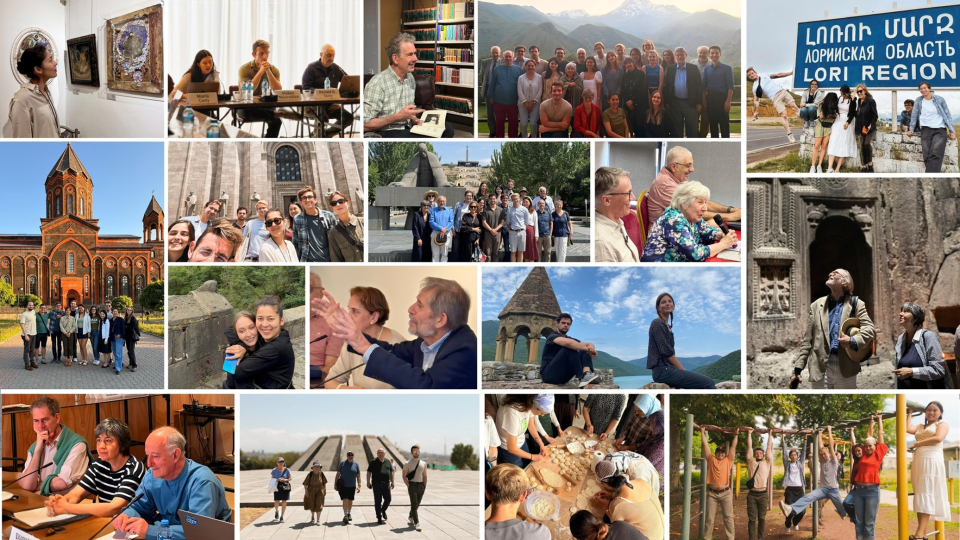Monterey Symposium 2026

Monterey Summer Symposium 2026
We are pleased to announce that the tenth anniversary Monterey Summer Symposium will take place in Uzbekistan, Georgia, and Armenia on June 19 - July 10, 2026. For the first time in the symposium’s history, we expand into Central Asia, adding a crucial new dimension to our examination of Russia’s imperial legacy, Soviet transformation, and contemporary influence across the post-Soviet space.
Uzbekistan, Georgia, and Armenia—each with millennia of history—stand today at the epicenter of intensifying great power competition. The 2025 visit of all five Central Asian heads of state to the White House and the new agreements signed there signal a potential turning point: Central Asia has become a contested space where Russia, China, and the United States vie for influence. How will this three-way competition unfold? What agency do these nations possess in shaping their own futures? These questions are urgent and consequential for global order.
At a time when direct contact between Russia and the West remains limited, there is greater need for dialogue among experts from Central Asia, the South Caucasus, the United States, Europe, and Russia. The Monterey Symposium offers unique optics through which to view Russian politics, foreign policy, and Russia’s place in a rapidly changing world.
The symposium will take place in historic cities—Tashkent, Samarkand, Bukhara, Tbilisi, and Yerevan—each location selected to illuminate the interplay of imperial legacies, contemporary geopolitics, and cultural identity. From the architectural splendors of the Silk Road to the ancient monasteries of the Caucasus, participants will witness firsthand regions where history continues to unfold.
While Russia’s influence in these regions—historical and contemporary—cannot be ignored, regional actors have consistently found ways to assert autonomy, balance competing powers, and pursue independent paths. Uzbekistan’s new era of reforms, Armenia’s strategic repositioning, and Georgia’s Euro-Atlantic aspirations on its own terms all demonstrate that these are not passive objects of great power politics but active agents navigating complex realities. Understanding these dynamics is essential for grasping the nature and limits of Russian power, Chinese economic expansion, and American strategic engagement. The addition of Central Asia allows for comparative analysis across the post-Soviet space: authoritarian governance and democratic experiments, Islamic and Orthodox civilizations, resource-rich and resource-poor development strategies, and varying approaches to managing relations with Moscow, Beijing, and Washington.
The Monterey Symposium gives rising experts, diplomats, serious graduate students of Russian history, Eurasian geopolitics, and international relations a unique opportunity to get out of classrooms and offices and engage with colleagues and local experts in real time on the major issues of our era. Twelve selected fellows will join world-leading scholars and prominent regional experts from Uzbekistan, Georgia, and Armenia for an intensive multidisciplinary program.
Fellows will analyze imperial formations and their afterlives, examining how Tsarist conquest and Soviet rule shaped these regions and continue to influence contemporary politics. They’ll explore the war in Ukraine in comparative historical context and assess its implications for Russian influence across the former Soviet space. They’ll probe questions of national identity, religious politics, and cultural memory. They’ll examine Belt and Road economics, military alliances, and diplomatic strategies as great powers compete for regional influence. Through methods drawn from history, political science, cultural anthropology, and area studies, participants will develop nuanced understanding of these complex societies.
Participants will visit major historical sites—from Samarkand’s Registan to Tbilisi’s old city to Yerevan’s Genocide Memorial—learning about architecture, culture, religious traditions, and historical memory. In a bilingual program conducted in English and Russian, fellows will engage with primary sources, local scholars, and communities across three countries.
As we celebrate the tenth anniversary of the Monterey Summer Symposium, we expand our scope at a moment when Central Asia and the South Caucasus have become critical arenas of global competition. This experience and close acquaintance with these regions will give fellows not just new knowledge but a new angle of vision—essential for understanding Russia, the post-Soviet space, and the emerging geopolitical order.
Application deadline: February 9, 2026.
Applicants will be notified of admission decisions by March 9, 2026.
Applications should include the following:
- Cover sheet
- CV
- Statement of purpose (maximum 600 words)
- Abstract of current research (maximum 200 words)
- Details of Russian language proficiency (maximum 200 words)
- Two letters of recommendation (emailed directly to Professor Anna Vassilieva)
- Official transcripts from each post-secondary institution attended
Selected candidates from the shortlist will participate in an online video interview with Professor Vassilieva and the Monterey Symposium Selection Committee.
For more information on the Monterey Summer Symposium 2026, please contact Professor Anna Vassilieva at (avassili@middlebury.edu) or Vicken Mouradian (vmmourad@gmail.com).
All applications must be in English and should be submitted electronically using this form: forms.gle/kt66rBAdA8vMWFtJ8.
The Monterey Summer Symposium is made possible through the generous support of Carnegie Corporation of New York.
